Abstract
Immunosuppression is readily demonstrable in the acute phase of Trypanosoma cruzi infection but subsides during the chronic phase. In vitro, living T. cruzi induces important alterations in mitogen-activated human T and B lymphocytes and inhibits their capacity to proliferate. These effects are reproduced by a protein spontaneously released by this parasite, termed trypanosomal immunosuppressive factor (TIF). In this study we asked whether TIF would also inhibit a T. cruzi-specific immune response and if it is produced in a mammalian host during infection. A significant reduction in the level of [3H]thymidine incorporation by spleen cells from chronically infected mice stimulated with a T. cruzi antigen preparation ensued when TIF was added to the cultures. Production of TIF in T. cruzi-infected individuals was denoted by the ability of serum IgG from either chronically infected patients or mice to abolish, in a concentration-dependent manner, the capacity of TIF to suppress interleukin-2 receptor expression by phytohaemagglutinin-stimulated human lymphocytes. This neutralizing activity was absent in the IgG fractions prepared from sera of healthy volunteers, noninfected mice or mice killed at different times during acute T. cruzi infection. Circulating anti-TIF antibodies represent indirect evidence of TIF production in vivo which, together with TIF-mediated inhibition of T. cruzi-specific lymphoproliferation, raise the possibility that TIF controls anti-parasite immune responses in vivo. The presence of TIF-neutralizing antibodies during chronic but not acute T. cruzi infection may be one of the reasons why immunosuppression is confined to the acute stage.
Full text
PDF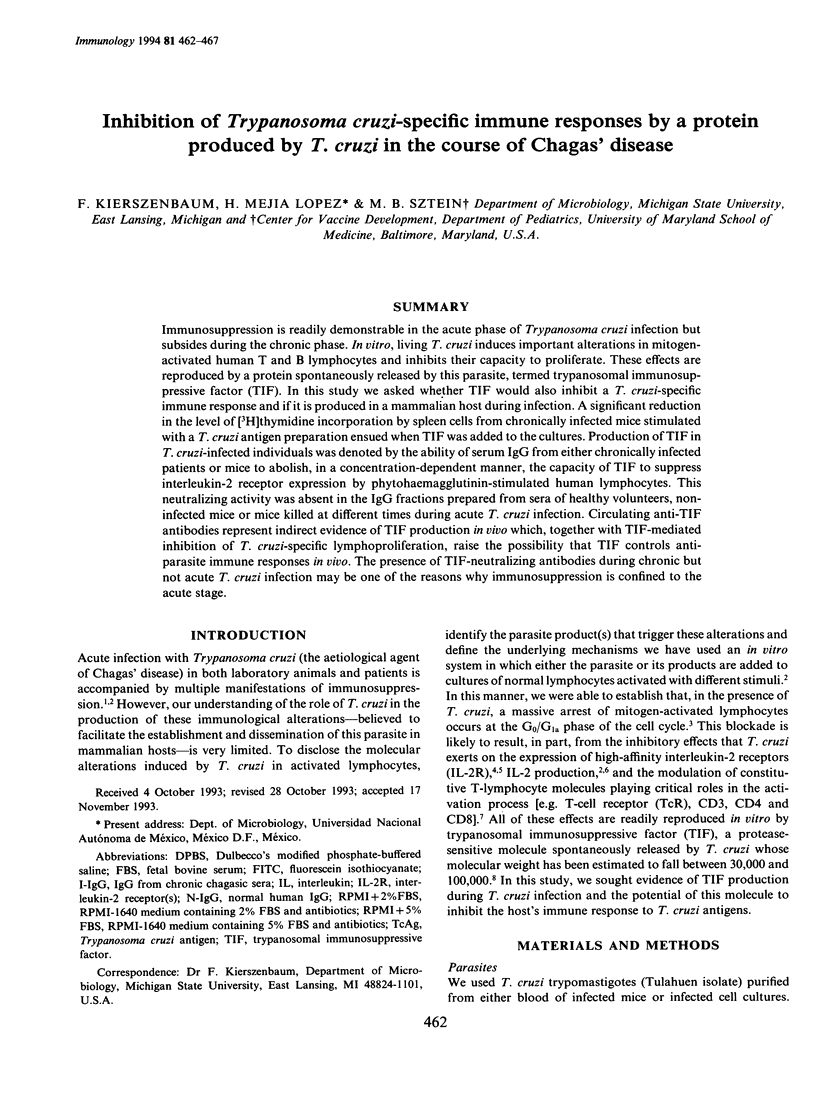
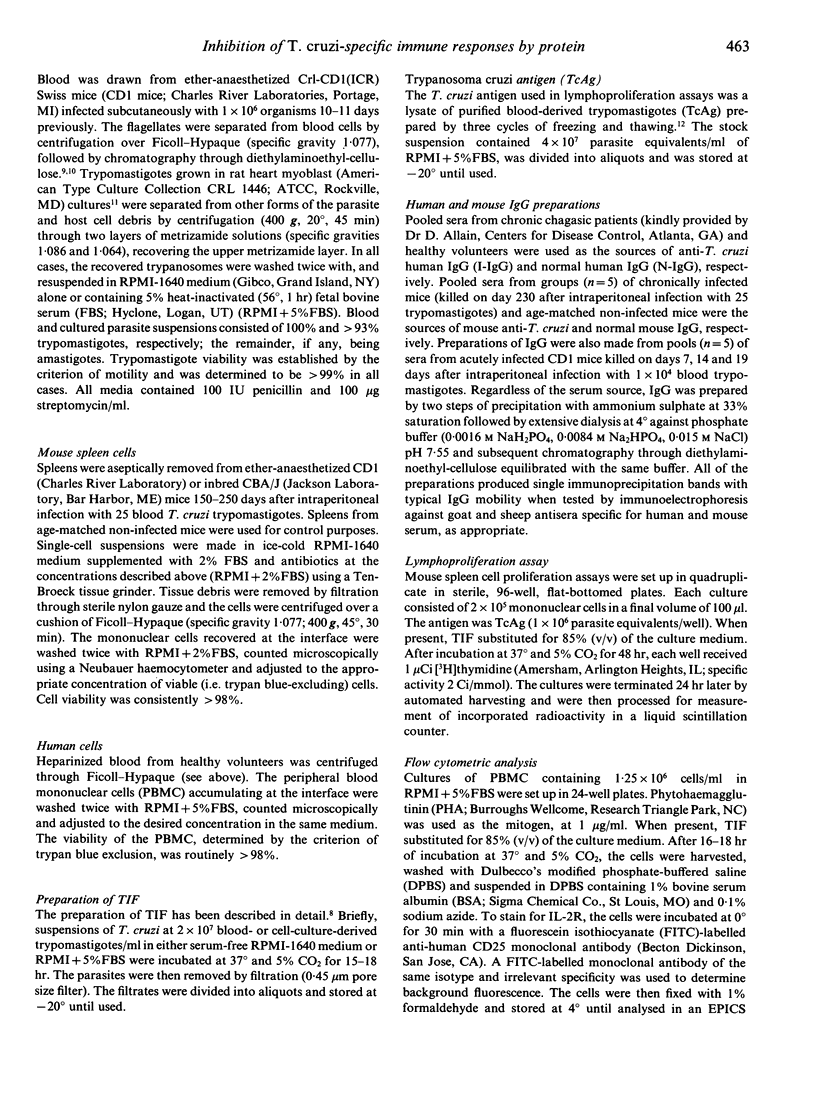
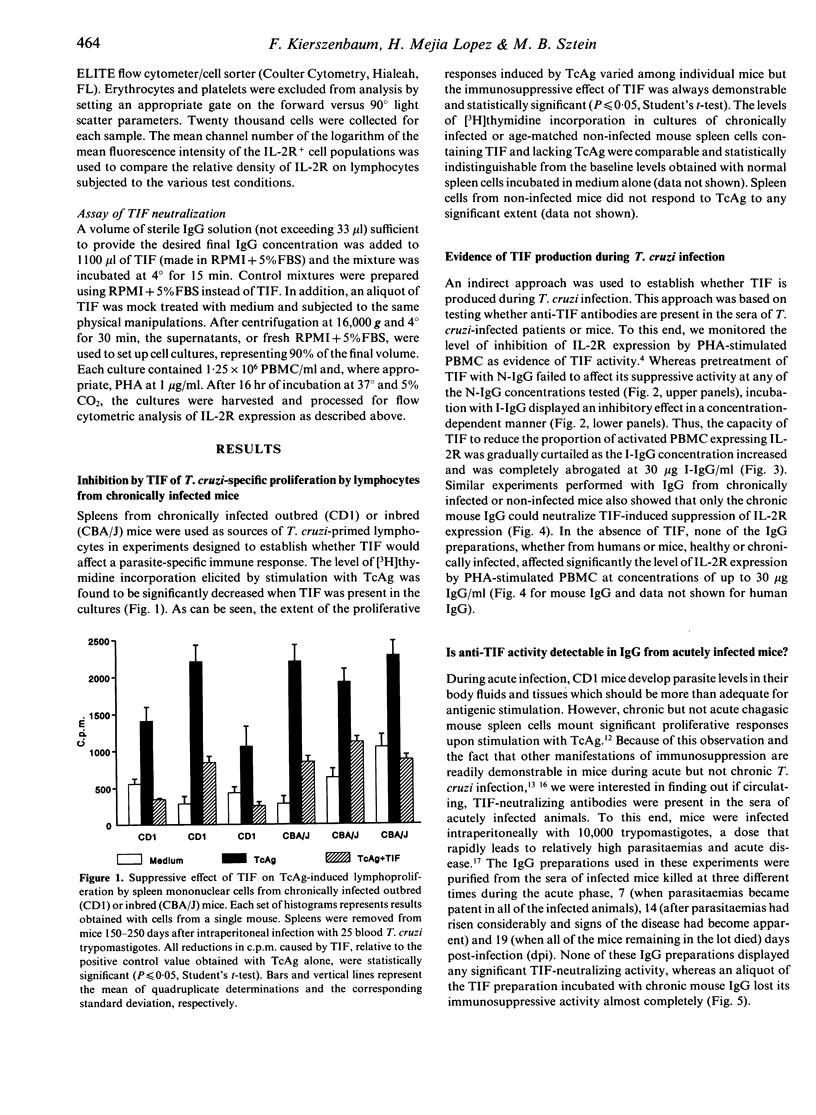
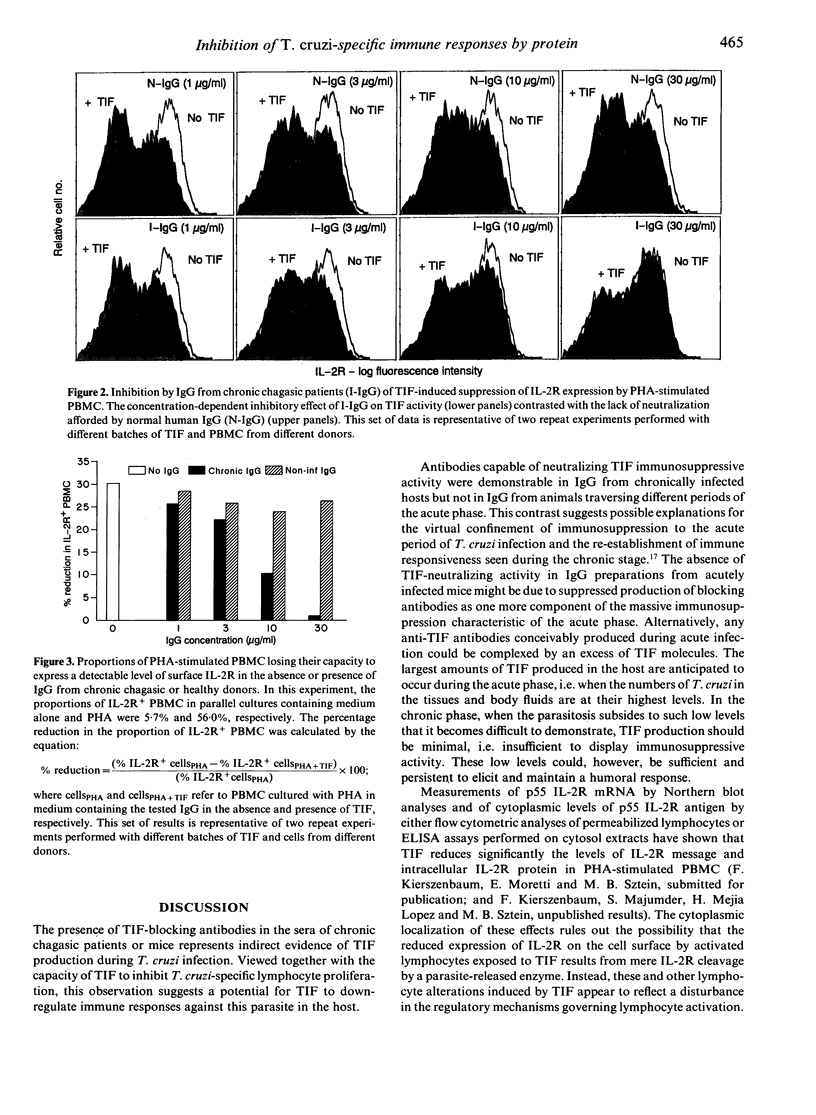
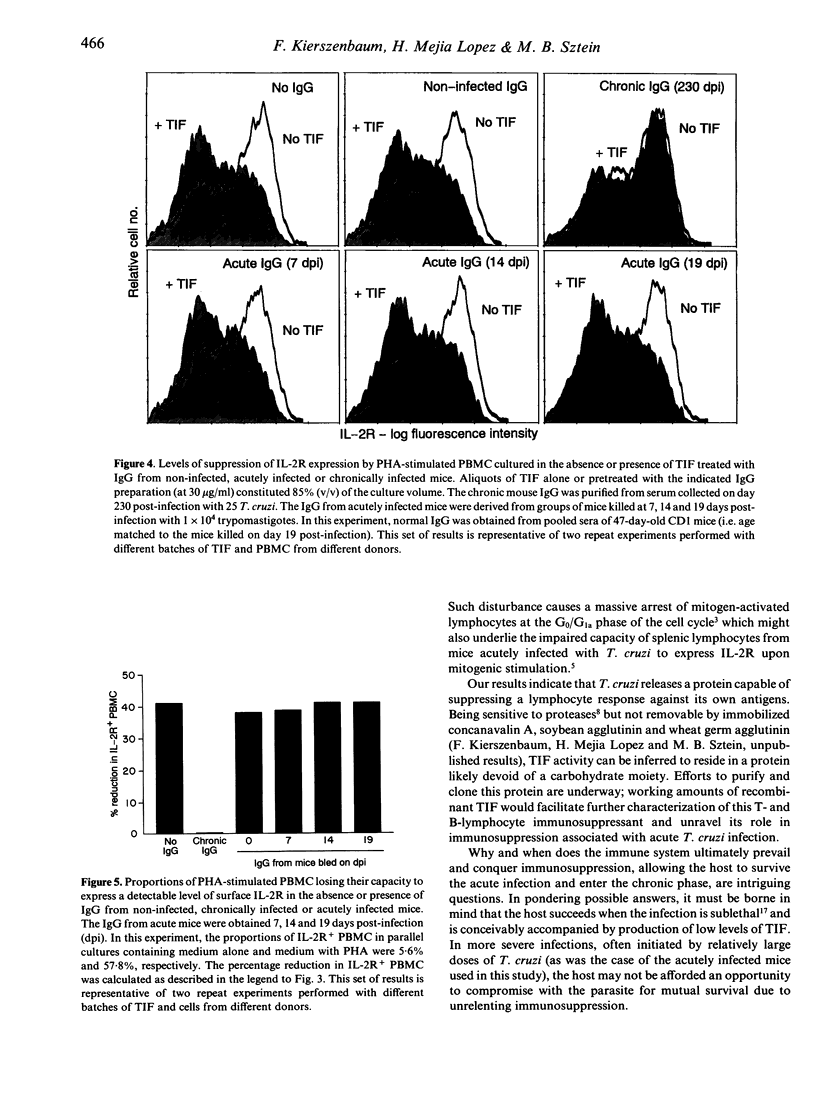
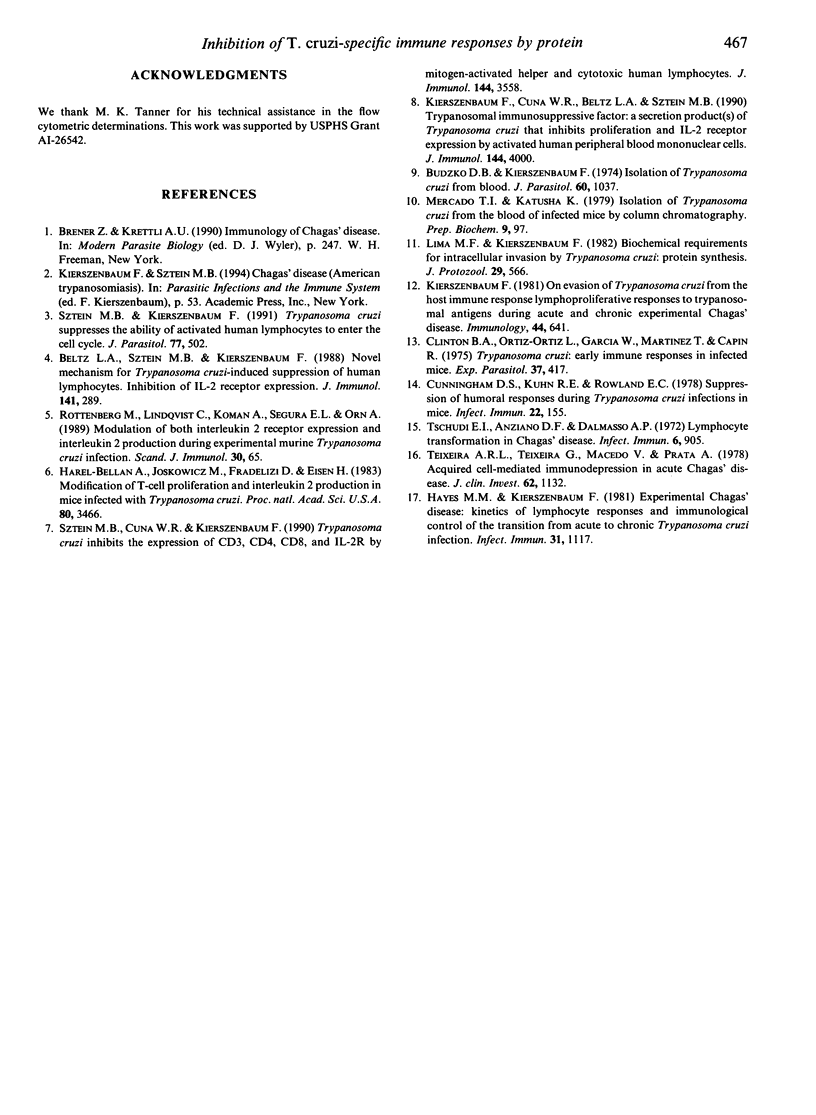
Selected References
These references are in PubMed. This may not be the complete list of references from this article.
- Beltz L. A., Sztein M. B., Kierszenbaum F. Novel mechanism for Trypanosoma cruzi-induced suppression of human lymphocytes. Inhibition of IL-2 receptor expression. J Immunol. 1988 Jul 1;141(1):289–294. [PubMed] [Google Scholar]
- Budzko D. B., Kierszenbaum F. Isolation of Trypanosoma cruzi from blood. J Parasitol. 1974 Dec;60(6):1037–1038. [PubMed] [Google Scholar]
- Clinton B. A., Ortiz-Ortiz L., Garcia W., Martinez T., Capin R. Trypanosoma cruzi: early immune responses in infected mice. Exp Parasitol. 1975 Jun;37(3):417–425. doi: 10.1016/0014-4894(75)90012-0. [DOI] [PubMed] [Google Scholar]
- Cunningham D. S., Kuhn R. E., Rowland E. C. Suppression of humoral responses during Trypanosoma cruzi infections in mice. Infect Immun. 1978 Oct;22(1):155–160. doi: 10.1128/iai.22.1.155-160.1978. [DOI] [PMC free article] [PubMed] [Google Scholar]
- Harel-Bellan A., Joskowicz M., Fradelizi D., Eisen H. Modification of T-cell proliferation and interleukin 2 production in mice infected with Trypanosoma cruzi. Proc Natl Acad Sci U S A. 1983 Jun;80(11):3466–3469. doi: 10.1073/pnas.80.11.3466. [DOI] [PMC free article] [PubMed] [Google Scholar]
- Hayes M. M., Kierszenbaum F. Experimental Chagas' disease: kinetics of lymphocyte responses and immunological control of the transition from acute to chronic Trypanosoma cruzi infection. Infect Immun. 1981 Mar;31(3):1117–1124. doi: 10.1128/iai.31.3.1117-1124.1981. [DOI] [PMC free article] [PubMed] [Google Scholar]
- Kierszenbaum F., Cuna W. R., Beltz L. A., Sztein M. B. Trypanosomal immunosuppressive factor: a secretion product(s) of Trypanosoma cruzi that inhibits proliferation and IL-2 receptor expression by activated human peripheral blood mononuclear cells. J Immunol. 1990 May 15;144(10):4000–4004. [PubMed] [Google Scholar]
- Kierszenbaum F. On evasion of Trypanosoma cruzi from the host immune response. Lymphoproliferative responses to trypanosomal antigens during acute and chronic experimental Chagas' disease. Immunology. 1981 Nov;44(3):641–648. [PMC free article] [PubMed] [Google Scholar]
- Lima M. F., Kierszenbaum F. Biochemical requirements for intracellular invasion by Trypanosoma cruzi: protein synthesis. J Protozool. 1982 Nov;29(4):566–570. doi: 10.1111/j.1550-7408.1982.tb01337.x. [DOI] [PubMed] [Google Scholar]
- Mercado T. I., Katusha K. Isolation of Trypanosoma cruzi from the blood of infected mice by column chromatography. Prep Biochem. 1979;9(1):97–106. doi: 10.1080/00327487908061675. [DOI] [PubMed] [Google Scholar]
- Rottenberg M., Lindqvist C., Koman A., Segura E. L., Orn A. Modulation of both interleukin 2 receptor expression and interleukin 2 production during experimental murine Trypanosoma cruzi infection. Scand J Immunol. 1989 Jul;30(1):65–72. doi: 10.1111/j.1365-3083.1989.tb01189.x. [DOI] [PubMed] [Google Scholar]
- Sztein M. B., Cuna W. R., Kierszenbaum F. Trypanosoma cruzi inhibits the expression of CD3, CD4, CD8, and IL-2R by mitogen-activated helper and cytotoxic human lymphocytes. J Immunol. 1990 May 1;144(9):3558–3562. [PubMed] [Google Scholar]
- Sztein M. B., Kierszenbaum F. Trypanosoma cruzi suppresses the ability of activated human lymphocytes to enter the cell cycle. J Parasitol. 1991 Jun;77(3):502–505. [PubMed] [Google Scholar]
- Teixeira A. R., Teixeira G., Macêdo V., Prata A. Acquired cell-mediated immunodepression in acute Chagas' disease. J Clin Invest. 1978 Dec;62(6):1132–1141. doi: 10.1172/JCI109232. [DOI] [PMC free article] [PubMed] [Google Scholar]
- Tschudi E. I., Anziano D. F., Dalmasso A. P. Lymphocyte transformation in Chagas disease. Infect Immun. 1972 Dec;6(6):905–908. doi: 10.1128/iai.6.6.905-908.1972. [DOI] [PMC free article] [PubMed] [Google Scholar]


